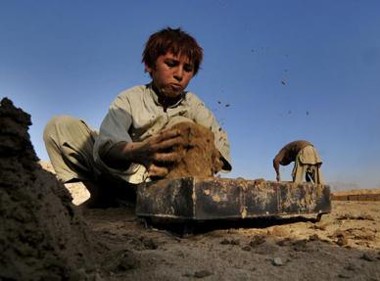By Steve Rennie

Young Afghan day labourers Amin, 13 (L) and his brother Taza, 12, make bricks on the outskirts of Kabul. Already, 30 percent of Afghan children aged 5 to 14 are engaged in some form of work. (Photo: AFP)
There's a lot the sooty-faced boy doesn't know.
His own name, for one thing. Or how much money he earns dishing out bowls of rice from his weathered metal stand. But he knows it's his job to feed his family.
The boy leans an arm on the counter to chat with a visitor. If he had a dish rag tossed over one shoulder and a white T-shirt stretched over a beer gut, he'd look like a short-order cook at some Canadian greasy-spoon diner.
Except that he's probably no more than eight or nine years old - another of the dirt-poor child labourers of Afghanistan, their numbers legion in a country that has known little but war and destitution for the last three decades.
Over a tattered brown tunic, he wears a drab green jacket with a fleece collar. An embroidered cap in the style worn by men from Kandahar sits atop a thick mat of black hair. Dirt mottles his shiny cheeks.
He lives with his family in a neighbourhood called Hazrat Ji Baba in the centre of Kandahar city. His father, he says, is an old man who does not work, so it falls to him to earn his family's keep.
"I am working morning to evening," he says in a falsetto voice that has not yet reached adolescence.
Half a dozen girls wearing clean head scarves and blue knapsacks clamour around a stand made of dull steel and flecked with lime-green paint.
The boy unfurls small, clear plastic bags by blowing into them. He scoops yellow rice from a pot and dishes it into bags that he hands to a little girl in a white head scarf. She says something and turns away.
He hands a plastic bowl and metal spoon to another girl whose chin barely reaches the countertop.
He is cook, waiter and dishwasher all at once.
In another part of the city, little Parwana is braiding black rags.
She is taking a break from picking up garbage.
Her fingers expertly pull and twist the rags as she she sits against a pile of stones, her knees pulled up to her chest.
She wears a fuzzy black cardigan over a red-and-yellow patterned tunic that hangs to her pink slippers. Her sun-kissed auburn tresses need brushing.
Parwana lives in a place in the city called Shadi Nanbai. She says her father is a driver who makes a meagre wage. They can't afford wood for the stove.
"Morning to evening, we collect trash," she says.
"We burn trash to cook food on. We don't have wood at home."
Thirteen years old, Wali Muhammad is middle-aged compared to the other working children.
The tail of his long and dingy grey turban dangles over one shoulder and down his back. His ragged beige tunic and pants are smeared with black shoe polish at the elbows and knees.
He quickly polishes a brown leather sandal with a wooden bristle brush. He doesn't look up as he speaks. Bottles of different coloured polish, brushes and twine are spread around him.
Wali Muhammad lives in Yakh Kariz, a hardscrabble neighbourhood in the city's southeastern corner.
He went to school once, but now he spends his days sitting cross-legged on a carpet on the sidewalk shining shoes.
He says he makes what works out to one Canadian dollar a day - the family's only source of sustenance, since his elderly father does not work.
Car horns honk and dirt bike engines growl and Wali Muhammad reaches for another sandal, pining to be free of grown-up responsibilities - to do what kids his age are supposed to do.
"I wish to go to school," he says. "Like other children."



